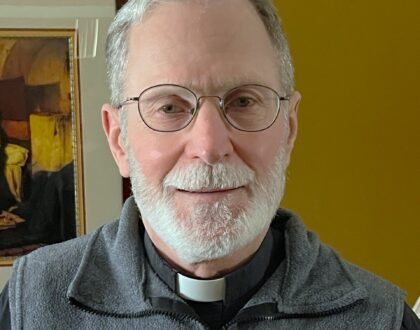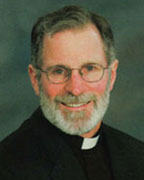Homily, March 10, 2024

From The Pastor
The readings on this fourth Sunday of Lent make evident the endless mercy, justice, and faithfulness of God. The love of God is unwavering and undeniable. Each reading gives its own example. Beginning in the Old Testament, the Book of Chronicles conveys both the frustration of God as well as God’s merciful and just response to human sin.
The reading describes God’s response to the rampant infidelities, rejection of the prophets sent by God, and the consistent efforts of the Lord to call his people to renewed fidelity. They refuse the ways of the Lord to the point where no remedy can be found. Messengers are mocked, warnings are ignored, and the prophets are scorned. The disorder and injustice of bad government and the rejection of Divine warnings lead to the destruction of the Temple, burning of the city, and exile into Babylon. This tragic outcome fulfills the prophecy of Jeremiah seventy years earlier.
God’s response to all this infidelity and disorder? God inspires the pagan King Cyrus of Persia to send the Jewish people back to their homeland, rebuild the Temple, and restore the city. In other words, God reaffirms and restores the covenant with his people. God’s response to infidelity is Divine mercy and faithfulness. God will not leave his people in the death of sin.
Mindful of this history, St. Paul strengthens the fidelity of God through the mercy of Jesus. While we were dead in sin, we were brought to new life in the dying and rising of the Lord Jesus. In Christ, God reveals the immeasurable grace accomplished in the Lord’s Cross. Paul writes in this way to make it abundantly clear that our salvation is not our doing. It is God’s gift, an unmerited, freely given, undeserved revelation of Divine kindness. We cannot earn or pay God for what we are freely given in Christ.
The gospel serves as a capstone of this mystery. First, confusion. Nicodemus, a leader, and keeper of the Law secretly meets Jesus in the dark of night. He believes in Jesus but fears exposure to his colleagues. He believes in Jesus but lacks understanding. Jesus uses an image from the time of Moses with which Nicodemus would be familiar. Due to their sin of complaining against God, the people are dying from poisonous snake bites, the sting of sin. Moses tells them to make an image of the snake and hang it high on a pole. All who look at the snake, which is a symbol of their sin and its painful consequence, will be healed. The image is clearly of Jesus who is hung high on a Cross bearing the weight of all sin. All who look on Christ and believe in him will be saved. We see in the dying of Christ who takes on all sin not only the disfigurement of sin, but the beauty of redemptive love fulfilled in the power of the Resurrection.
Why is God so endlessly merciful and radically faithful? Because God so loved the world that he gave his only Son, so that all who believe in him might not perish but have eternal life. Ponder this. You have heard it a hundred times. Put it in your mouth and taste it. Chew and swallow it. Make it your own. Allow it to be food for your life, meaning, and identity in Christ.
Go to the next verse for confirmation. ‘God did not send the Son into the world to condemn the world, but that the world might be saved through him.’ This verse is of equal or greater value than the previous one. Why? Because we are afraid to believe and trust the words of love in the pain of our sin. Taste these words. Chew them. Swallow. Digest. Repeat until they become your truth.
Hard to do, right? Christianity is the most radical religion in the world. No other religion proclaims the unconditional love of God revealed in the Lord Jesus. Under the weight of sin, the most difficult challenge of Christianity is to let God love you despite the incompleteness and imperfection of your life. Why is this so difficult? Because it is so freely and unconditionally given. People do not like handouts. People want to pay their own way. We do not like to be in debt to others which makes us feel out of control. We feel undeserving of so great a gift without some return of payment. That is why many people prefer to live by the Law and not by the Spirit. I can be in control of the Law. I can keep the Law faithfully and therefore justify myself before God when I get to heaven. God will not have to do any heavy forgiving for me. I kept the Law. I am good.
Fear causes resistance to the undefeatable love God has for us. Why? To surrender to love is vulnerable. To surrender to perfect love can be terrifying because we fear that we will lose ourselves and be consumed with vulnerability by such love. It is hard to surrender, especially when we feel guilty and afraid. When your children do wrong and you correct them, do you want them to feel guilty and unworthy because of their fault? Neither does God. God wants us free, and the best way to be free is to believe and trust in the love God freely gives in the Lord Jesus. This is the faith we profess. It is why we are given forty days of Lent to feed ourselves on the mercy of God that will always triumph over our sin; if we allow it. Let God love you. Your response, love your neighbor as you love yourself.
Father John Esper
Recent Sermons

Homily, March 30, 2025
March 27, 2025

Homily, March 23, 2025
March 20, 2025

Homily, March 16, 2025
March 11, 2025

